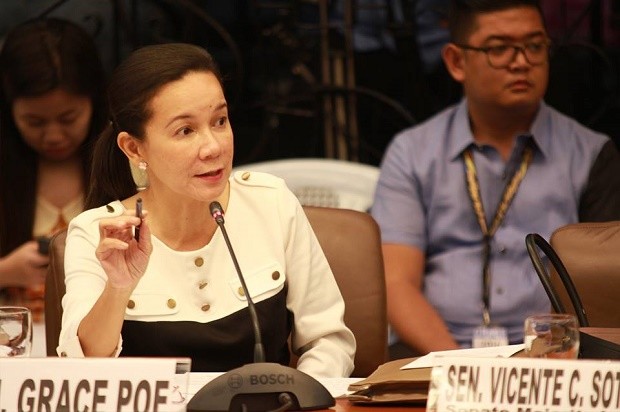Poe calls anew for swift FOI bill passage
For the second time, Senator Grace Poe took the Senate floor to open the debates on the proposed Freedom of Information (FOI) and pressed for its immediate passage.
Poe is chair of the Senate committee on public information and mass media, which led the passage of Senate Bill 1208 known as the “People’s Freedom of Information Act of 2016.”
READ: FOI bill advances in the Senate
Aside from her, 21 other senators signed the report prepared by her committee.
“This is my second time to sponsor this bill, and hopefully the last. This proposed law is 24 years or one generation in the making, which compels us to finish the job during our watch, and not leave it to the next generation,” Poe said in her sponsorship speech.
READ: Poe’s panel wraps up FOI hearings, sees passage before year end
She noted that the Senate, during the last Congress, had not only tackled the FOI bill but it unanimously approved the measure on March 10, 2014.
Article continues after this advertisement“The House, however, failed to pass the pass the bill on third reading. Natakot ata sila na malalaman na ang mga pinakatatago nilang sikreto, kung kaya ayaw nilang ipasa kaagad ang FOI (Perhaps they were afraid that their secrets would be revealed that’s why they didn’t want to pass the FOI),” said the senator.
Article continues after this advertisementPoe said the passage of the bill would strengthen the executive order (EO) on FOI issued by President Rodrigo Duterte “by providing for criminal penalties, by creating a uniform standard, by closing the loopholes, by clearly defining the exceptions, and above all, by meeting the demands of the people to create an antidote to irregularities.”
The bill, she said, provides for “proactive disclosure,” such that certain information must be published or accessible to the public, even without the public requesting for such information.
Poe said Sections 8 and 9 of the bill have enumerated information that should be immediately available and uploaded on an agency’s website, such as the statement of assets, liabilities and networth (SALN) of the President, Vice President, members of the Cabinet, members of Congress, justices of the Supreme Court, among others.
“You see, Mr. President, our proposed law is not just about transparency and accountability, it is also about creating an enabling environment for meaningful social participation in public affairs,” she said.
“Sa ilalim ng batas, pwede, halimbawa, kunin ang address ng mga bahay ng isang opisyal sa SALN. Pero kalabisan namang humingi pa ng litrato ng mga silid-tulugan o imbentaryo ng mga anik-anik sa loob ng bahay.”
(Under the law, an official’s address stated in the SALN could be provided. But it is too much to ask for photos of the bedrooms or inventory of things inside the house.)
Exempted from disclosure, however, are those that will compromise national security, defense, law enforcement operations, foreign relations, trade and economic secrets and the constitutional right to privacy and safety.
Unlike an EO, Poe said the FOI bill provides for criminal and not just administrative liabilities.
“Mr. President, my dear colleagues, the FOI Act is long overdue. Let us not delay its passage anymore as it has been delayed long enough,” the senator said.
Senators Joel Villanueva, Juan Edgardo “Sonny” Angara and Joseph Victor “JV” Ejercito, who were among the authors of the measure, also took the floor to co-sponsor it. RAM
